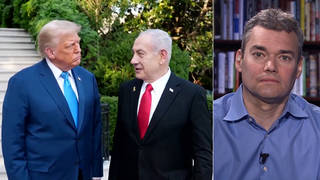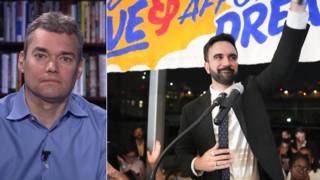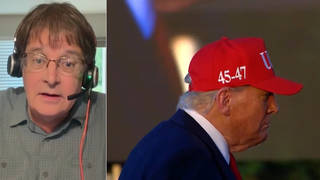
Guests
- Shibley Telhamiprofessor of peace and development at the University of Maryland, senior fellow at the Center for Middle East Policy and co-editor of The One State Reality: What Is Israel/Palestine?
In Part 2 of our interview with Middle East scholar Shibley Telhami, we discuss how Israel’s war on Palestinians after the Hamas attack could impact U.S. efforts to normalize relations with Saudi Arabia, and more. Telhami is professor of peace and development at the University of Maryland and a senior fellow at the Center for Middle East Policy.
Transcript
AMY GOODMAN: This is Democracy Now!, democracynow.org, The War and Peace Report. I’m Amy Goodman, with Juan González.
We are speaking to Shibley Telhami, Part 2 of our conversation, professor of peace and development at the University of Maryland, also a senior fellow at the Center for Middle East Policy, co-editor of the book The One State Reality: What Is Israel/Palestine?
Professor Telhami, this Hamas surprise attack took place right as the U.S. was negotiating the normalization of the relationship between Saudi Arabia and Israel. Do you think that played a role? And do you think that is not going to happen at this point? Explain the significance of it.
SHIBLEY TELHAMI: Well, I don’t think it played a direct role in the sense that Hamas is trying to prevent that from happening. But I think what happened is they — Hamas is a political entity, too, and they’re trying to reap benefits, and especially against the Palestinian Authority. And they’re reading the despair, not just in Gaza, but also in the West Bank, I think — the, you know, 56 years of occupation, a right-wing Israeli government, increasing settler violence. I was there last week. I was in Israel and the West Bank last week, and the despair is really tremendous. That despair is partly related to the rapprochement between Saudi Arabia and Israel, in the sense that Palestinians had hoped that either the Biden administration, after Trump, would try to get on a path toward ending the occupation, or the Arab governments would weigh in to, you know, help them a little bit. And there was obviously complete, you know, resignation that no one in the world is coming to their aid just as they’re facing a lot more encroachment from the settlers. And so, in that sense, that’s the kind of thing that Hamas is trying to capture. So, in that sense, yes.
And for that matter, this attack has reshuffled the deck. It put the Palestinian issue front and center in the Arab world, and really even internationally, obviously, but especially in the Arab world. And the Saudis, you know, the government obviously has its own strategic interests, like any government. It wanted to pursue those, and those didn’t coincide necessarily with Palestinian interests. But the public opinion cares about this issue deeply. And now with this, you know, war in progress, their public is going to care more and going to be drawn into it. And for one thing, also it’s going to preoccupy the Israelis, and it’s going to preoccupy the United States. So, in that sense, it really does put it off at least for a while, even if it doesn’t, you know, dramatically change the strategic calculus.
JUAN GONZÁLEZ: And, Professor, you — in our previous conversation, you referred to the importance of Hezbollah in this situation. Hezbollah has, by all accounts, a much more extensive fighting capacity than does Hamas in the Gaza Strip. What would be the implications of Hezbollah deciding to get involved in solidarity with what is going on in the Gaza Strip?
SHIBLEY TELHAMI: Look, I hope they don’t get involved. I mean, honestly, no one needs war. No one needs civilians being killed. That’s what’s going to happen, as we’ve witnessed both in the Hamas attack and now in Gaza. It is heartbreaking. No one wants to see death and destruction. We shouldn’t wish that. We should wish for ending of this fighting and a path forward to peace that both Israelis and Palestinians and everyone in the world needs.
But if they do, there is no question that they have a much greater capacity than Hamas. They’re much more effective. They’ve obviously been supported by Iran dramatically. They have weapons that are probably more accurate, that likely can reach any part of Israel. Their rockets are said to be far more sophisticated. And they’ve been planning this for a long time, in case the — you know, everybody’s been expecting another round of fighting at some point between Hezbollah and Israel. Obviously, Israel has a huge amount of power that it could bring to bear. And, of course, the most in Lebanon who will suffer will be Lebanese civilians and the state and the infrastructure. No one should wish that on Lebanon, either, and no one should wish that on anyone.
But nonetheless, even if Hezbollah’s own calculus is not to enter right now, I think they want to be in a position to call their own shots. They’ve been very careful. And this is not the moment. They have faced a lot of problems inside. Their calculus is much more closely connected to Iran than Hamas. They have to think about this. But you could see how easily someone could be dragged into it. We’ve already seen flare-up. They’re testing each other, sending signals to each other, Israel and Hezbollah. But in the end, if it happens, we have a much larger war on our hands.
AMY GOODMAN: I want to ask you about Iran. Of course, the Republicans, especially their presidential candidates, are seizing on the deal that Biden made to release the $6 billion of frozen Iranian assets that Qatar is holding right now, and they’re saying this is Biden’s fault. Can you talk about the role of Iran with Hamas, with Hezbollah, and what its interests are here?
SHIBLEY TELHAMI: Yeah, I mean, there’s no question that Iran helps Hamas, militarily and intelligence, and undoubtedly. You know, they both admit it. It’s open. It’s not something secretive. And how much of it? Probably quite a lot. That’s a different story from saying Iran is calling the shots, as might be the case in some cases with Hezbollah, where they have a very close, cooperative relationship. Hamas’s decision, in my opinion, was — it was improbable that it was tied to anything instigated by Iran directly, or that it was in some shape or form related to what transpired in the prison releases that took place with the Biden administration. Hamas is making its own decisions.
Obviously, Iran is going to be supportive of them. I don’t even know that this is actually an opportune moment for Iran, if it was going to be on behalf of Iran, in part because I think, in general, they want their allies, to the extent that they are going to help them, if there is a war between Israel and Iran, which no one is expecting at the moment. But also I think they were hoping that the prisoner exchange would lead to another step in the nuclear deal between between Iran and the U.S. And now that’s not on the table anymore. This actually delays it, makes it harder. So I don’t think that’s the case.
Obviously, you’re going to have people exploiting this, to connect Iran more deeply into it. The U.S. has already said there is no evidence that Iran has something to do with this decision of Hamas. But we are in a political season where there’s so much going on that is completely related to our political season. That’s what we see here, obviously, people exploiting that. And, of course, in Israel, you’re going to have more finger-pointing, as well, in order to distract from the failure of the Israeli government and the failure of intelligence. And that’s going to be something, obviously, Israelis don’t want to deal with now. They’ll deal with it at some point — they usually do — after the crisis is over. But I think there’s a lot of that finger-pointing taking place that’s political.
JUAN GONZÁLEZ: And, Professor Telhami, I wanted to ask you about another key player that has really had a low profile in all of this, the Palestinian Authority. Over the past year, more than 200 Palestinians have been killed in raids into the West Bank by Israeli forces. But has the Palestinian Authority effectively lost its [inaudible] as the spokesperson of the Palestinian people?
SHIBLEY TELHAMI: Well, I mean, they haven’t in the international community, because the international community needs them. They need to speak to someone. They’re obviously not going to speak to Hamas, especially after this. And in any case, Hamas is characterized a terrorist organization by the U.S. and many other governments, in addition to Israel. That’s not going to happen. So the Palestinian Authority is the address, and it’s going to remain the address for the Arab countries, for the international community, for the U.N., for the U.S.
But from the point of view of the public, it has lost its authority a long time ago. I think, you know, talking to people just last week, I mean, people who are anti-Hamas, people who don’t want to see violence, people who are, you know, more wanting to see a political movement that’s constructive, they look at it more as subcontractor of Israeli security. They know that it can’t defend them. It hasn’t been able to defend them against, let’s say, the settler attacks. And this attack by Hamas, in many ways, marginalizes even more — marginalizes them even more. And I think that was, you know, something that probably Hamas calculated as something gaining the upper hand over the Authority even more.
AMY GOODMAN: You are a professor at University of Maryland, Palestinian American. Your family is from not the Occupied Territories. Can you — first of all, how are they? And can you talk about the significance of that perspective that you bring to your work and this perspective?
SHIBLEY TELHAMI: I grew up inside the state of Israel in Haifa area. I still have loved ones there. And the advantage that you see is, of course, the humanity that you get out. I mean, to me, the demonization is the biggest thing in a war. You tend to demonize the other side very deeply. I think what you need to understand, and everybody needs to understand, that like Israelis and Palestinians and Americans and Egyptians and Afghanis, you know, people are very mixed. And there are people who are very offended about what Israel does in the West Bank and Gaza very deeply. Obviously, the system is the system. The politics is the politics. But it’s really the humanity, I think, which has become to me as the center point. To me, I don’t — I cannot see civilians hurt, whether they’re Jewish or Arab, whether they’re American or Afghani or Iraqi. And I think that’s something that we all need to take. It’s something that we all need to work to prevent. We need to — we need to sober up. We need to prevent our hearts from getting hardened. I think these are moments that harden the hearts. That’s the worst thing in the human condition. And that’s why I think political leaders need to grow above that. Political leaders need to speak with moral authority. And we need to see that from President Biden.
AMY GOODMAN: Shibley Telhami, we want to thank you so much for being with us, professor of peace and development at the University of Maryland, also senior fellow at the Center for Middle East Policy, co-editor of the book The One State Reality: What Is Israel/Palestine? I’m Amy Goodman, with Juan González. To see Part 1 of our discussion, go to democracynow.org. Thanks so much for joining us.












Media Options